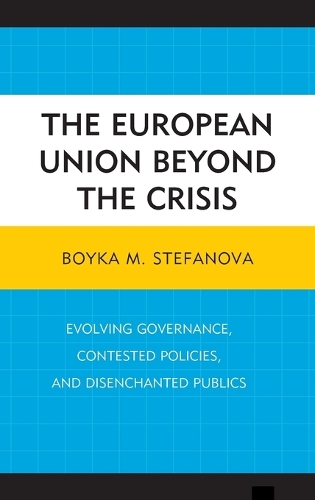
The European Union beyond the Crisis: Evolving Governance, Contested Policies, and Disenchanted Publics
(Hardback)
Publishing Details
The European Union beyond the Crisis: Evolving Governance, Contested Policies, and Disenchanted Publics
By (Author) Boyka M Stefanova
Contributions by Hilary Appel
Contributions by Carissa T. Block
Contributions by Jennifer Boyle
Contributions by Giorgos Bithymitris
Contributions by Evelyn Bytzek
Contributions by Cristina Ares Castro-Conde
Contributions by Robert I. Csehi
Contributions by Leif Johan Eliasson
Contributions by Miguel Glatzer
Bloomsbury Publishing PLC
Lexington Books
14th November 2014
United States
Classifications
Professional and Scholarly
Non Fiction
Comparative politics
Political structures / systems: democracy
Central / national / federal government policies
Political economy
341.2422
Physical Properties
Hardback
356
Width 159mm, Height 237mm, Spine 30mm
635g
Description
This volume explores institutional and policy developments in the EU and its member states in a parallel examination of citizens views of the effectiveness of crisis response reflected in public trust, output legitimacy, and satisfaction with democracy. Our approach to understanding the crisis posits EU-level governance and institutional change, national-level policymaking, and domestic politics as interrelated, interdependent domains of political action and public spheres that collectively shape the political landscape of post-crisis Europe. The volume sheds new light on the relationship among the institutional, policy, and polity consequences of the crisis. The book has two fundamental aims. The first is to demonstrate the interconnected nature of European governance, domestic reform, and democratic politics. The unprecedented complexity of the financial, sovereign debt, economic, and social crises in Europe has led to a political crisis that reflects the struggle to effectively address its various causes and effects. The second objective is to present a theoretically informed assessment of the consequences of the European crises for state-society relations and democratic legitimacy. Our analysis of the crisis in a variety of national contexts and European governance highlights the difficulties faced by political decision-makers. We find that the domestic policy process is selectively affected or disconnected from the process of rule-making at the EU level, that public opinion still matters in the process of policy formation and EU crisis response, and that the salience of the EU agenda in the domestic public sphere increasingly depends on the preferences of political actors. Public response to the crisis has become increasingly complex as well, ranging from declining trust in the political institutions, emerging national stereotypes, changing expectations of the EU level of crisis response, growing disconnect between political parties and voters, and evolving intra-regional distinctions across the EUs east-west divide.
Reviews
The financial and economic crisis of 2008 provoked a political earthquake in the European Union, affecting EU institutions, member states, and the citizens of Europe in dramatic fashion. The European Union beyond the Crisis: Evolving Governance, Contested Policies, Disenchanted Publics is remarkable in its ability to analyze how the interdependence and tensions between EU governing structures, national governments, and citizens impacted the policy responses to the crisis. In that respect, it goes beyond rehearsed discussions around multi-level governance or the democratic deficit in the European Union and represents a very welcome addition to the literature on EU politics and policymaking. -- Sebastien Lazardeux, St. John Fisher College
This large collection of essays offers both the essential background and a challenge to those interested in understanding the consequences of the global financial crisis of 20072009 for European governance. It provides fresh insight into the long-standing questions of political trust and democratic legitimacy in times of crisis. The theoretical claims are substantiated by detailed cases studies and sophisticated analyses of public opinion. There is no doubt this will be seen as an exciting contribution to the literature on European politics and beyond. -- Jana Grittersova, University of California, Riverside
Author Bio
Boyka Stefanova is associate professor in the Department of Political Science and Geography at the University of Texas at San Antonio.
